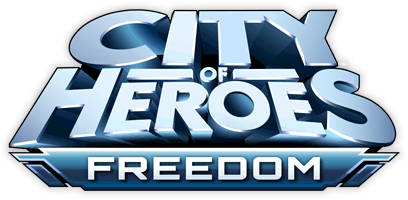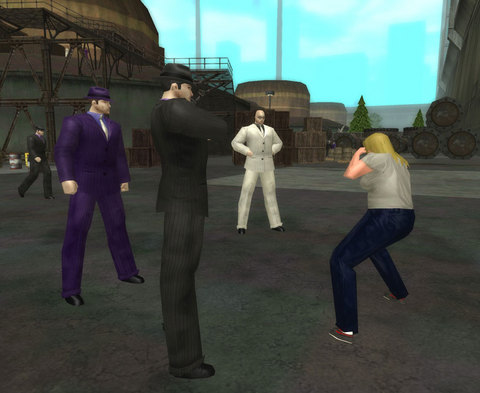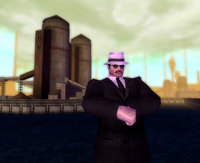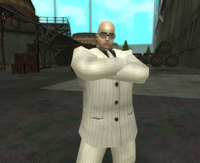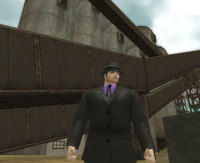The Family
Contents
- Know Your Adversary Overview
- Arachnos
- Cap au Diable Demons
- Carnival of Shadows
- The Circle of Thorns
- Clockwork
- The Contaminated
- Coralax Hybrids
- The Council
- Crey Industries
- The Family
- Freakshow
- The Gold Brickers
- Hellions
- The Igneous
- Knives of Artemis
- The Legacy Chain
- Longbow
- The Lost
- Luddites
- Malta
- Mooks and Marcones
- Nerva Spectral Daemons
- Outcasts
- Paragon Police Department
- The Rikti
- Rogue Island Police
- Shivan
- Skulls
- Sky Raiders
- Slag Golems
- Snakes
- Spectral Pirates
- Trolls
- Tsoo
- Vahzilok
- The Warriors
- Wyvern
The Family
Despite a world of giant monsters, super-powered vigilantes, undead horrors, and alien invaders, there are those who believe the old values and established traditions are the most important things in life.
These rough men by their nature live on the edges of law-abiding society. They deal in the illegal and the immoral, and create a space for themselves through the rule of the gun or knife. They profit by exploiting the weakness of others while maintaining a veneer of civility around the Sunday night dining table. They are The Family.
The origins of The Family can be traced directly to Paragon City in the 70s, and even more loosely back to the 20s and 30s. In the heyday of organized crime, Paragon’s underworld was controlled by the Sicilian Families: Blundetto, Bonanno, Dante, Denaro, Garibaldi, Genovese, Gravano, Gualtieri, Liggio, Marcone, Navarra, Troia, and Verandi.
A who’s who of Italian names originally from Corleone and Capaci, and Palermo Centro and Santa Maria di Gesu. The Prohibition era was a boon to them, as Rhode Island was one of two states not to ratify the 18th Amendment to the Constitution (“Prohibition”), and 400 miles of Rhode Island’s un-policed coastline was a dream for rumrunners who smuggled in good quality liquor from Canada and the Bahamas.
Several of the families were rumored to be funded by some mysterious benefactor. He was some sort of wealthy industrialist (the stories say), who provided a significant investment of cash for them to run their rackets.
In exchange, he gained influence over them and could potentially manipulate them for his ulterior motives. This benefactor may have also helped arm and equip the gangs, for they certainly had an easy time accessing military-grade munitions.
One of the families to gain prominence early was the Marcone family. They operated from a speakeasy called Caesar’s, which was visited every week by Prohibition agents … who delivered cases of wine, scotch, rye, and gin!
The agents would then enjoy their fill of Marcone food and drink, sitting down in the cellar with the Marcones and their guests.
The Sicilian Families bought the police, owned the politicians, and put the fear of the mob into the hearts of the hardworking poor of Paragon City. They controlled the rackets, the speakeasies, the bootlegging, and the prostitution.
Territory was fought over in quick and bloody strikes, but for the most part there was enough profit for everyone to fill their pockets and the families were held together by Old World traditions. The Sicilian Families rose to dominate the New England mafia, ruling from Paragon, Rhode Island.
Gang wars, gambling dens, and backroom deals were the order of the day – until it all changed with the birth of the Freedom Phalanx in the 1930s. Statesman’s team put tremendous pressure on the organized crime families, and rather than band together they tended to tear each other apart.
Several families were destroyed in this era, any mysterious benefactors were scared off, and they lost control of the New England mafia – with control moving to Boston. A “tough-on-crime” mayor and city council was elected in 1936, and those who survived the mass-arrests scurried back into the shadows.
The crime lords nursed their wounds and slowly rebuilt their empires, bringing in their families, absorbing distant cousins, promoting proven soldiers. By the 1960s, the Sicilian Families were ready to plunder Paragon once again.
At a sit-down at Bell Point in the heart of Independence Port, territory was again divvied up and partitioned. Several families would stake their claims in Paragon, focusing on Independence Port and Steel Canyon, a few would move out to the territory of Striga Isle, while other families would move into the Rogue Isles in the wake of the lucrative mining and industrial ventures currently booming off the coast.
The Marcones rapidly moved into the Rogue Isles, where they took root before any of their rivals could find a niche. They bought their way into the docks, brought in drugs and prostitutes for the miners, and fought fiercely with anyone who got in their way. In Paragon, meanwhile, the other families formed partnerships with a number of drug cartels and street gangs.
One of the up-and-coming drug traffickers was a young hood named Harry Frost. Frost had a rap sheet for petty larceny, and was arrested several times for distribution of controlled substances, but the charges never stuck. He managed to avoid tangling with the street-oriented Super Groups, like the Regulators, but still made a name for himself as a “go to” guy.
When the Regulators and the Dawn Patrol teamed up and took their War on Drugs to the drug fields of South America and Central Asia the North American street dealers panicked. Many got out of the business or went into hiding, but long-range thinkers like Frost bided their time and made sure they were positioned to take advantage of the next big thing – it happened to be the first cut of Superadine.
Harry became the contact point for Superadine. Numerous dealers crawled back out of the woodwork and lined up to be on his payroll. With such an ever-increasing street rep Harry could no longer keep a low profile, and his men began to clash with the various Super Groups in Paragon.
Frost’s gang was known as the Frost Cartel, and they ran the entire supply chain for Superadine, acting as the contact and distribution point for the Sicilian Families.
At one point the Regulators managed to corner Frost and deliver him to the authorities. While he suffered a brief stint in prison, his lieutenants struck back hard at the Regulators. In the midst of a brutal ambush, the Illustrated Woman, aka Mina Horne, was killed.
These events ratcheted up the tension between the groups. When Frost was released a short time later after several key witnesses disappeared, the animosity between him and Back Alley Brawler and the Regulators was extreme.
Back Alley Brawler redoubled his efforts to put a dent in the drug trade on Paragon’s streets. After a series of daring raids put the heat on the traffickers, the Regulators followed a tip to a front company for the Frost Cartel.
In late 1982, the Regulators stormed a building that concealed a major distribution center for the Cartel, and they closed it down. Harry Frost had been at the site at the time, and he attempted to flee. Frost was chased to the roof by Back Alley Brawler, and during the confrontation Frost was accidentally killed, falling to his death.
An investigation cleared the Back Alley Brawler of any suspicion, but Frost’s death would have major implications for the city.
Meanwhile, despite the Regulators efforts the Superadine flow didn’t stop. Several other dealers immediately filled Harry’s role – it was as if some mysterious benefactor was supplying them.
The Regulators worked with the mystics in the Midnight Squad to finally track the drug back to a source – a secret laboratory beneath a skyscraper in Steel Canyon. They uncovered a well-funded, high-tech research center where the scientists were studying the effects of Superadine on a wide range of test subjects.
The Regulators shut the facility down with the help of the Freedom Phalanx, and although the scientists were arrested, over the ensuing weeks they would vanish into the system – clearly they had powerful connections who could pull strings for them. Similarly, much of the equipment and research vanished in a cloud of “national security.”
The respite from the drug trade was very short lived. It wasn’t long before some powerful figure seemed to be approaching the various leaders of the Sicilian Families and bringing them together. Both branches of the families, in Paragon and the Rogue Isles, appeared to be working more smoothly together than ever before.
Additionally, they redoubled their efforts to deal in Superadine. Amongst other possible sources, they seemed to have liberated some of the equipment the Regulators turned over to the authorities.
The Paragon Police Department noticed that the various families’ soldiers, capos, and underbosses appeared to be working for a common cause – a more rigid control of the underworld.
They also reported a much higher rate of encountering super-powered individuals in any gathering of these Mafiosi. It was as if they had access to a cleaner strain of Superadine for themselves. Eventually it was confirmed that some sort of Capo di tutti Capi (“boss of all bosses”) had unified the dons and their respective forces, and they were now all considered part of a new organization: The Family.
In Paragon post-Rikti War, The Family runs Independence Port, and has heavy influence in Steel Canyon. They also use Striga Isle as a way point between Paragon City and the Rogue Isles.
The core of their business depends on the flow of Superadine. It is where they make their most profits, though of course they still deal heavily in racketeering, blackmail, selling illegal arms, trafficking in other soft and hard drugs, and prostitution. They also deal in burgeoning markets of pirated DVDs and electronics, and classic crimes of hijacking shipments, stealing cars (and car parts), and so forth.
Because Superadine is so important to their cash flow, they are clearly connected to other criminal gangs such as the Trolls and the Skulls, but the depths of those connections remains undiscovered.
Meanwhile, The Family in the Rogue Isles splintered into two warring factions with the conviction of their don, Manuel Marcone. Despite the long, drawn-out gang war, The Family’s power in the Rogue Isles is deeply entrenched.
